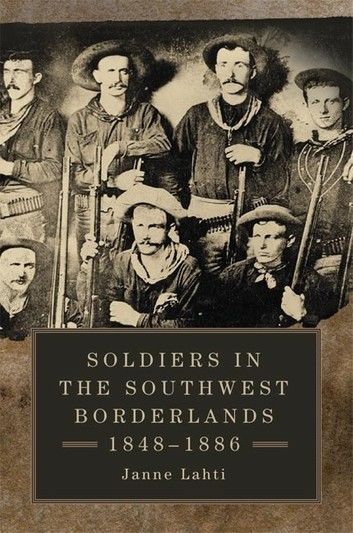| FindBook |
有 1 項符合
Soldiers in the Southwest Borderlands, 1848–1886的圖書 |
 |
Soldiers in the Southwest Borderlands, 1848–1886 出版社:University of Oklahoma Press 出版日期:2017-04-13 語言:英文 |
| 圖書館借閱 |
| 國家圖書館 | 全國圖書書目資訊網 | 國立公共資訊圖書館 | 電子書服務平台 | MetaCat 跨館整合查詢 |
| 臺北市立圖書館 | 新北市立圖書館 | 基隆市公共圖書館 | 桃園市立圖書館 | 新竹縣公共圖書館 |
| 苗栗縣立圖書館 | 臺中市立圖書館 | 彰化縣公共圖書館 | 南投縣文化局 | 雲林縣公共圖書館 |
| 嘉義縣圖書館 | 臺南市立圖書館 | 高雄市立圖書館 | 屏東縣公共圖書館 | 宜蘭縣公共圖書館 |
| 花蓮縣文化局 | 臺東縣文化處 |
|
|
Most military biographies focus on officers, many of whom left diaries or wrote letters throughout their lives and careers. This collection offers new perspectives by focusing on the lives of enlisted soldiers from a variety of cultural and racial backgrounds. Comprised of ten biographies, Soldiers in the Southwest Borderlands showcases the scholarship of experts who have mined military records, descendants’ recollections, genealogical sources, and even folklore to tell common soldiers’ stories.
The essays examine enlisted soldiers’ cross-cultural interactions and dynamic, situational identities. They illuminate the intersections of class, culture, and race in the nineteenth-century Southwest. The men who served under U.S. or Mexican flags and on the payrolls of the federal government or as state or territorial volunteers represented most of the major ethnicities in the West—Hispanics, African Americans, Indians, American-born Anglos, and recent European immigrants—and many moved fluidly among various social and ethnic groups. For example, though usually described as an Apache scout, Mickey Free was born to Mexican parents, raised by an American stepfather, adopted by an Apache father, given an Irish name, and was ultimately categorized by federal authorities as an Irish Mexican White Mountain Apache. George Goldsby, a former slave of mixed ancestry, served as a white soldier in the Union army during the Civil War, and then served twelve years as a “Buffalo Soldier” in the all-black Tenth U.S. Cavalry. He also claimed some American Indian ancestry and was rumored to have crossed the Mexican border to fight alongside Pancho Villa.
What motivated these soldiers? Some were patriots and adventurers. Others were destitute and had few other options. Enlisted men received little professional training, and possibilities for advancement were few. Many of these men witnessed, underwent, or inflicted extreme violence, some of it personal and much of it related to excruciating military campaigns.
Spotlighting ordinary men who usually appear on the margins of history, the biographical essays collected here tell the stories of soldiers in the complex world of the Southwest after the U.S.-Mexican War.
|










